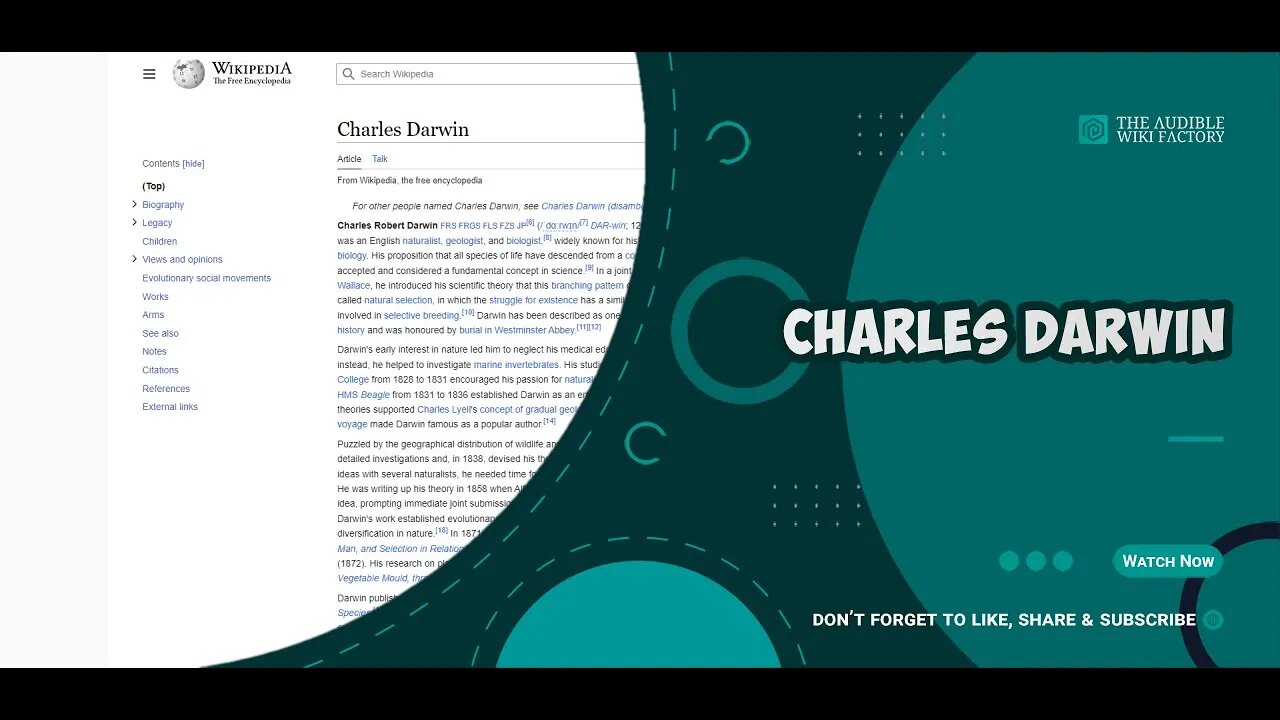Premium Only Content

Charles Robert Darwin was an English naturalist, geologist, and biologist, widely known for his
Charles Robert Darwin was an English naturalist, geologist, and biologist, widely known for his contributions to evolutionary biology. His proposition that all species of life have descended from a common ancestor is now generally accepted and considered a fundamental concept in science. In a joint publication with Alfred Russel Wallace, he introduced his scientific theory that this branching pattern of evolution resulted from a process he called natural selection, in which the struggle for existence has a similar effect to the artificial selection involved in selective breeding. Darwin has been described as one of the most influential figures in human history and was honoured by burial in Westminster Abbey.
Darwin's early interest in nature led him to neglect his medical education at the University of Edinburgh; instead, he helped to investigate marine invertebrates. His studies at the University of Cambridge's Christ's College from 1828 to 1831 encouraged his passion for natural science. His five-year voyage on HMS Beagle from 1831 to 1836 established Darwin as an eminent geologist whose observations and theories supported Charles Lyell's concept of gradual geological change. Publication of his journal of the voyage made Darwin famous as a popular author.
Puzzled by the geographical distribution of wildlife and fossils he collected on the voyage, Darwin began detailed investigations and, in 1838, devised his theory of natural selection. Although he discussed his ideas with several naturalists, he needed time for extensive research and his geological work had priority. He was writing up his theory in 1858 when Alfred Russel Wallace sent him an essay that described the same idea, prompting immediate joint submission of both their theories to the Linnean Society of London. Darwin's work established evolutionary descent with modification as the dominant scientific explanation of diversification in nature. In 1871, he examined human evolution and sexual selection in The Descent of Man, and Selection in Relation to Sex, followed by The Expression of the Emotions in Man and Animals (1872). His research on plants was published in a series of books, and in his final book, The Formation of Vegetable Mould, through the Actions of Worms (1881), he examined earthworms and their effect on soil.
Darwin published his theory of evolution with compelling evidence in his 1859 book On the Origin of Species. By the 1870s, the scientific community and a majority of the educated public had accepted evolution as a fact. However, many favoured competing explanations that gave only a minor role to natural selection, and it was not until the emergence of the modern evolutionary synthesis from the 1930s to the 1950s that a broad consensus developed in which natural selection was the basic mechanism of evolution. Darwin's scientific discovery is the unifying theory of the life sciences, explaining the diversity of life.
EARLY LIFE AND EDUCATION
Charles Robert Darwin was born in Shrewsbury, Shropshire, on 12 February 1809, at his family's home, The Mount. He was the fifth of six children of wealthy society doctor and financier Robert Darwin and Susannah Darwin (née Wedgwood). His grandfathers Erasmus Darwin and Josiah Wedgwood were both prominent abolitionists. Erasmus Darwin had praised general concepts of evolution and common descent in his Zoonomia (1794), a poetic fantasy of gradual creation including undeveloped ideas anticipating concepts his grandson expanded.
Both families were largely Unitarian, though the Wedgwoods were adopting Anglicanism. Robert Darwin, himself quietly a freethinker, had baby Charles baptised in November 1809 in the Anglican St Chad's Church, Shrewsbury, but Charles and his siblings attended...
LINK TO ARTICLE: http://en.wikipedia.org/wiki/Charles_Darwin
TAGS: Charles Darwin, Utilitarians, Theoretical biologists, Royal Medal winners, Recipients of the Pour le Mérite (civil class), Recipients of the Copley Medal, Scientists from Shrewsbury, People educated at Shrewsbury School, Members of the Royal Swedish Academy of Sciences, Members of the Royal Netherlands Academy of Arts and Sciences, Members of the Royal Academy of Belgium, Members of the Lincean Academy, Members of the American Philosophical Society, Independent scientists, Human evolution, Human evolution theorists, Fellows of the Zoological Society of London, Fellows of the Royal Society, Fellows of the Royal Geographical Society, Fellows of the Royal Entomological Society, Fellows of the Linnean Society of London, Evolutionary biologists, Ethologists, English travel writers, English sceptics, English naturalists, English justices of the peace, English geologists, English entomologists
#GeneralKnowledge #AudibleWikiFactory #Audible #Wikipedia #CharlesDarwin
-
 13:12
13:12
The Audible Wiki Factory
1 year agoThe Carnival of Venice is an annual festival held in Venice, Italy. The carnival ends on Shrove
521 -
 52:21
52:21
The Rubin Report
1 hour ago‘Shark Tank’ Legend Notices Something About Trump’s Canada Plan No One Noticed
4.43K9 -
 LIVE
LIVE
Benny Johnson
1 hour agoPANIC: Massive Democrat Money Laundering Scandal EXPOSED, ActBlue in Collapse! Kash Criminal Charges
10,843 watching -
 LIVE
LIVE
Steven Crowder
3 hours ago🔴 USAID Shredding Conspiracy | What Everyone's Getting Wrong with Half Asian Lawyer Bill Richmond
39,447 watching -
 1:07:01
1:07:01
Timcast
2 hours agoTrump THREATENS MASSIVE 200% Tariff Against EU As GLOBAL Trade War IGNITES, China Hits Canada
39.7K43 -
 UPCOMING
UPCOMING
Flyover Conservatives
11 hours agoNew Documentary Reveals Life-Threatening Corruption in the U.S. Government! - Matt Thayer; Michelle Obama & Gavin Newsom Enter the Podcast Game—But Why Now?| FOC Show
5.22K -
 LIVE
LIVE
LFA TV
15 hours agoCORNERED RATS RETALIATE! | LIVE FROM AMERICA 3.13.25 11AM
5,068 watching -
 48:29
48:29
BonginoReport
4 hours agoSatanists Dedicate Kansas Capitol to Satan (Ep.159) - 03/13/2025
95.9K134 -
 2:07:09
2:07:09
Matt Kohrs
13 hours agoBreaking Market News: Tariffs, Inflation & Gov'nt Shutdown || The MK Show
48.2K3 -

Wendy Bell Radio
7 hours agoThe Schumer Shutdown
96.1K40